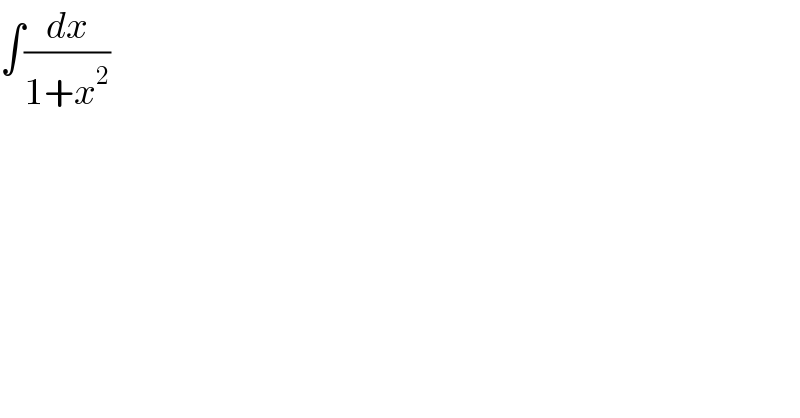Question Number 92138 by hore last updated on 05/May/20

$$\int\frac{{dx}}{\mathrm{1}+{x}^{\mathrm{2}} } \\ $$
Answered by john santu last updated on 05/May/20

$$\mathrm{tan}^{−\mathrm{1}} \left(\mathrm{x}\right)\:+\:\mathrm{c}\: \\ $$
Answered by Rio Michael last updated on 07/May/20

$$\int\:\frac{{dx}}{\mathrm{1}\:+\:{x}^{\mathrm{2}} } \\ $$$$\mathrm{let}\:{x}\:=\:\mathrm{tan}\:\theta\:\Rightarrow\:\frac{{dx}}{{d}\theta}\:=\:\mathrm{sec}^{\mathrm{2}} \theta \\ $$$$\Rightarrow\:\int\frac{{dx}}{\mathrm{1}+{x}^{\mathrm{2}} }\:=\:\int\:\frac{\mathrm{1}}{\mathrm{1}+\:\mathrm{tan}^{\mathrm{2}} \theta}\:\:\mathrm{sec}^{\mathrm{2}} \theta\:{d}\theta \\ $$$$\:\:\:\:\:\:\:\:\:\:\:\:\:\:\:\:\:\:\:\:\:=\:\int\frac{\mathrm{sec}^{\mathrm{2}} \theta}{\mathrm{sec}^{\mathrm{2}} \theta}{d}\theta\:\:\:\:\:\:\:\:\:\:\:\:\:\:\:\:\:_{\mathrm{1}\:+\:\mathrm{tan}^{\mathrm{2}} \theta\:=\:\mathrm{sec}^{\mathrm{2}} \theta} \\ $$$$\:\:\:\:\:\:\:\:\:\:\:\:\:\:\:\:\:\:\:\:=\:\int\:{d}\theta\:=\:\theta\:+\:{C} \\ $$$$\mathrm{but}\:{x}\:=\:\mathrm{tan}\:\theta\:\Rightarrow\:\theta\:=\:\mathrm{tan}^{−\mathrm{1}} {x} \\ $$$$\Rightarrow\int\:\frac{{dx}}{\mathrm{1}\:+\:{x}^{\mathrm{2}} }\:=\:\mathrm{tan}^{−\mathrm{1}} {x}\:+\:{C} \\ $$
